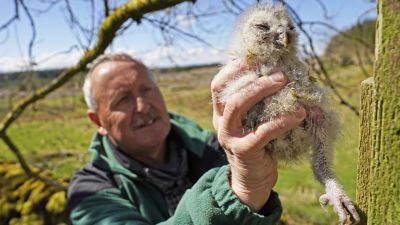UK is one of the most nature-depleted countries in the world

ITV News Reporter James Webster speaks to conservationists who say nature needs to recover across the whole countryside, not just at nature reserves
The UK is one of the most nature-depleted countries in the world with about half of its biodiversity left.
The country may not have enough biodiversity - the variety of plant and animal life - to prevent an ecological meltdown, researchers said.
It has just 53% of biodiversity left, well below the global average of 75%, according to the Natural History Museum.
Both figures are below the 90% level that experts believe is needed to prevent the world from tipping into an “ecological recession”.
Ecological recession could lead to a future in which ecosystems do not have enough biodiversity to function well, leading to crop failures and infestations that could cause shortages in food, energy and materials.
“Much of the world has lost a large amount of its natural biodiversity,” said Dr Adriana De Palma from the Natural History Museum.
“Those systems have lost enough biodiversity to mean that we have to be careful about relying on them functioning in the way that we need them to.”
Researchers at the museum developed the Biodiversity Intactness Index (BII), which measures the percentage of nature that remains in an area.
The UK's 53% BII is in the bottom 10% of the world’s countries and last among the G7 group of nations.
A lot of the damage to nature is linked to the industrial revolution, said Professor Andy Purvis, from the Natural History’s life sciences department.
He said: “That mechanised the destruction of nature to an extent, converting it into goods for profits.”
Dr De Palma said while there are some increases in the amount of high-quality natural vegetation that supports native species, those gains have been offset by the expansion of cropland and urban areas, and population growth.
Prof Purvis said he hopes the UK will not just rely on "offshoring biodiversity damage to other places”.
The Natural History Museum hopes its research will help global leaders next week when they meet for the UN Biodiversity Conference, known as COP15.
The conference, hosted by China, will take place online on October 11-15. A second meeting will be held in Kunming city in spring next year.
Leaders will try to agree new goals over the next 10 years.
None of the world’s last targets for protecting wildlife, which were set in Aichi, Japan, in 2010, were met.
“This is our last best chance for a sustainable future,” Prof Purvis said of COP15.
He continued: “Stopping further damage to the planet requires big change, but we can do it if we act now, together.
“Muddling through as we currently are doing is nowhere near enough to halt, let alone reverse, the ongoing worldwide decline in biodiversity.”